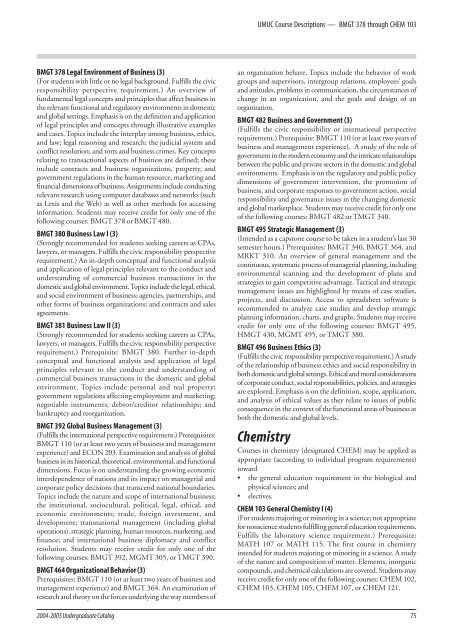Statements of Policy - UMUC Europe
Statements of Policy - UMUC Europe
Statements of Policy - UMUC Europe
Create successful ePaper yourself
Turn your PDF publications into a flip-book with our unique Google optimized e-Paper software.
BMGT 378 Legal Environment <strong>of</strong> Business (3)<br />
(For students with little or no legal background. Fulfills the civic<br />
responsibility perspective requirement.) An overview <strong>of</strong><br />
fundamental legal concepts and principles that affect business in<br />
the relevant functional and regulatory environments in domestic<br />
and global settings. Emphasis is on the definition and application<br />
<strong>of</strong> legal principles and concepts through illustrative examples<br />
and cases. Topics include the interplay among business, ethics,<br />
and law; legal reasoning and research; the judicial system and<br />
conflict resolution; and torts and business crimes. Key concepts<br />
relating to transactional aspects <strong>of</strong> business are defined; these<br />
include contracts and business organizations, property, and<br />
government regulations in the human resource, marketing and<br />
financial dimensions <strong>of</strong> business. Assignments include conducting<br />
relevant research using computer databases and networks (such<br />
as Lexis and the Web) as well as other methods for accessing<br />
information. Students may receive credit for only one <strong>of</strong> the<br />
following courses: BMGT 378 or BMGT 480.<br />
BMGT 380 Business Law I (3)<br />
(Strongly recommended for students seeking careers as CPAs,<br />
lawyers, or managers. Fulfills the civic responsibility perspective<br />
requirement.) An in-depth conceptual and functional analysis<br />
and application <strong>of</strong> legal principles relevant to the conduct and<br />
understanding <strong>of</strong> commercial business transactions in the<br />
domestic and global environment. Topics include the legal, ethical,<br />
and social environment <strong>of</strong> business; agencies, partnerships, and<br />
other forms <strong>of</strong> business organizations; and contracts and sales<br />
agreements.<br />
BMGT 381 Business Law II (3)<br />
(Strongly recommended for students seeking careers as CPAs,<br />
lawyers, or managers. Fulfills the civic responsibility perspective<br />
requirement.) Prerequisite: BMGT 380. Further in-depth<br />
conceptual and functional analysis and application <strong>of</strong> legal<br />
principles relevant to the conduct and understanding <strong>of</strong><br />
commercial business transactions in the domestic and global<br />
environment. Topics include personal and real property;<br />
government regulations affecting employment and marketing;<br />
negotiable instruments; debtor/creditor relationships; and<br />
bankruptcy and reorganization.<br />
BMGT 392 Global Business Management (3)<br />
(Fulfills the international perspective requirement.) Prerequisites:<br />
BMGT 110 (or at least two years <strong>of</strong> business and management<br />
experience) and ECON 203. Examination and analysis <strong>of</strong> global<br />
business in its historical, theoretical, environmental, and functional<br />
dimensions. Focus is on understanding the growing economic<br />
interdependence <strong>of</strong> nations and its impact on managerial and<br />
corporate policy decisions that transcend national boundaries.<br />
Topics include the nature and scope <strong>of</strong> international business;<br />
the institutional, sociocultural, political, legal, ethical, and<br />
economic environments; trade, foreign investment, and<br />
development; transnational management (including global<br />
operations), strategic planning, human resources, marketing, and<br />
finance; and international business diplomacy and conflict<br />
resolution. Students may receive credit for only one <strong>of</strong> the<br />
following courses: BMGT 392, MGMT 305, or TMGT 390.<br />
BMGT 464 Organizational Behavior (3)<br />
Prerequisites: BMGT 110 (or at least two years <strong>of</strong> business and<br />
management experience) and BMGT 364. An examination <strong>of</strong><br />
research and theory on the forces underlying the way members <strong>of</strong><br />
<strong>UMUC</strong> Course Descriptions — BMGT 378 through CHEM 103<br />
an organization behave. Topics include the behavior <strong>of</strong> work<br />
groups and supervisors, intergroup relations, employees’ goals<br />
and attitudes, problems in communication, the circumstances <strong>of</strong><br />
change in an organization, and the goals and design <strong>of</strong> an<br />
organization.<br />
BMGT 482 Business and Government (3)<br />
(Fulfills the civic responsibility or international perspective<br />
requirement.) Prerequisite: BMGT 110 (or at least two years <strong>of</strong><br />
business and management experience). A study <strong>of</strong> the role <strong>of</strong><br />
government in the modern economy and the intricate relationships<br />
between the public and private sectors in the domestic and global<br />
environments. Emphasis is on the regulatory and public policy<br />
dimensions <strong>of</strong> government intervention, the promotion <strong>of</strong><br />
business, and corporate responses to government action, social<br />
responsibility and governance issues in the changing domestic<br />
and global marketplace. Students may receive credit for only one<br />
<strong>of</strong> the following courses: BMGT 482 or TMGT 340.<br />
BMGT 495 Strategic Management (3)<br />
(Intended as a capstone course to be taken in a student’s last 30<br />
semester hours.) Prerequisites: BMGT 340, BMGT 364, and<br />
MRKT 310. An overview <strong>of</strong> general management and the<br />
continuous, systematic process <strong>of</strong> managerial planning, including<br />
environmental scanning and the development <strong>of</strong> plans and<br />
strategies to gain competitive advantage. Tactical and strategic<br />
management issues are highlighted by means <strong>of</strong> case studies,<br />
projects, and discussion. Access to spreadsheet s<strong>of</strong>tware is<br />
recommended to analyze case studies and develop strategic<br />
planning information, charts, and graphs. Students may receive<br />
credit for only one <strong>of</strong> the following courses: BMGT 495,<br />
HMGT 430, MGMT 495, or TMGT 380.<br />
BMGT 496 Business Ethics (3)<br />
(Fulfills the civic responsibility perspective requirement.) A study<br />
<strong>of</strong> the relationship <strong>of</strong> business ethics and social responsibility in<br />
both domestic and global settings. Ethical and moral considerations<br />
<strong>of</strong> corporate conduct, social responsibilities, policies, and strategies<br />
are explored. Emphasis is on the definition, scope, application,<br />
and analysis <strong>of</strong> ethical values as they relate to issues <strong>of</strong> public<br />
consequence in the context <strong>of</strong> the functional areas <strong>of</strong> business at<br />
both the domestic and global levels.<br />
Chemistry<br />
Courses in chemistry (designated CHEM) may be applied as<br />
appropriate (according to individual program requirements)<br />
toward<br />
• the general education requirement in the biological and<br />
physical sciences; and<br />
• electives.<br />
CHEM 103 General Chemistry I (4)<br />
(For students majoring or minoring in a science; not appropriate<br />
for nonscience students fulfilling general education requirements.<br />
Fulfills the laboratory science requirement.) Prerequisite:<br />
MATH 107 or MATH 115. The first course in chemistry<br />
intended for students majoring or minoring in a science. A study<br />
<strong>of</strong> the nature and composition <strong>of</strong> matter. Elements, inorganic<br />
compounds, and chemical calculations are covered. Students may<br />
receive credit for only one <strong>of</strong> the following courses: CHEM 102,<br />
CHEM 103, CHEM 105, CHEM 107, or CHEM 121.<br />
2004-2005 Undergraduate Catalog 75






